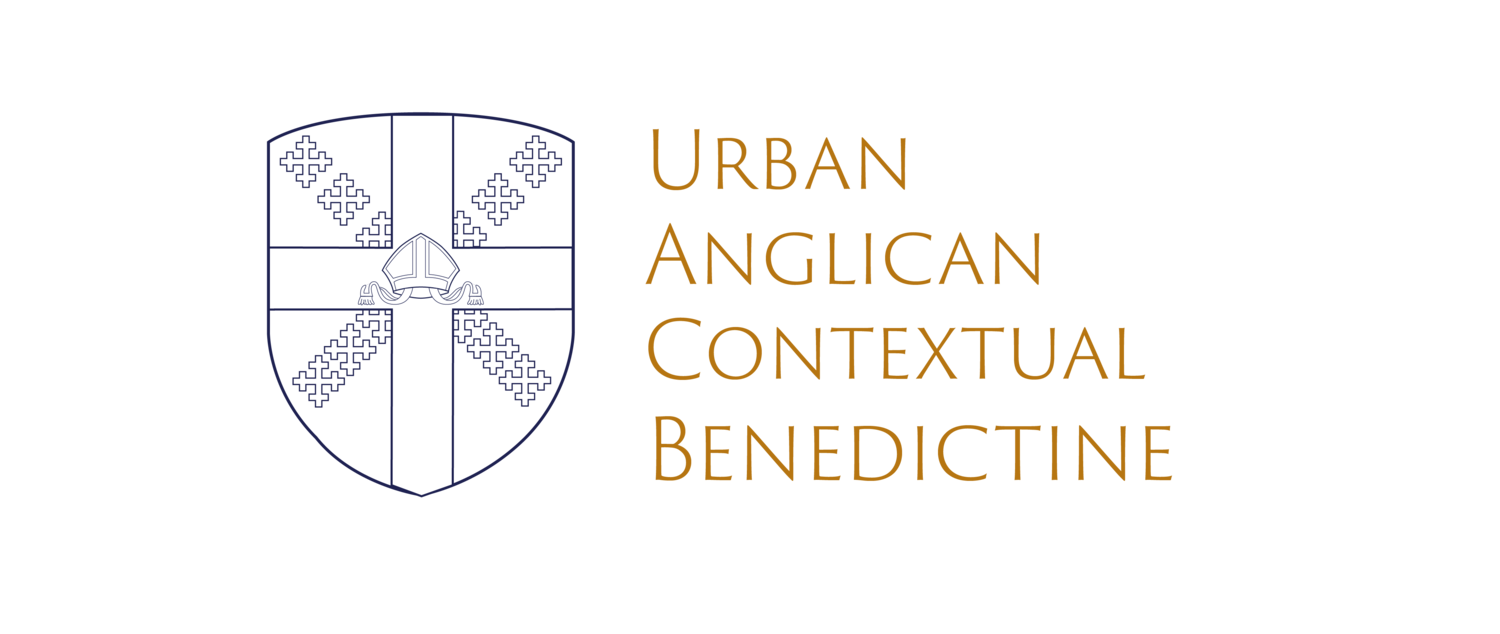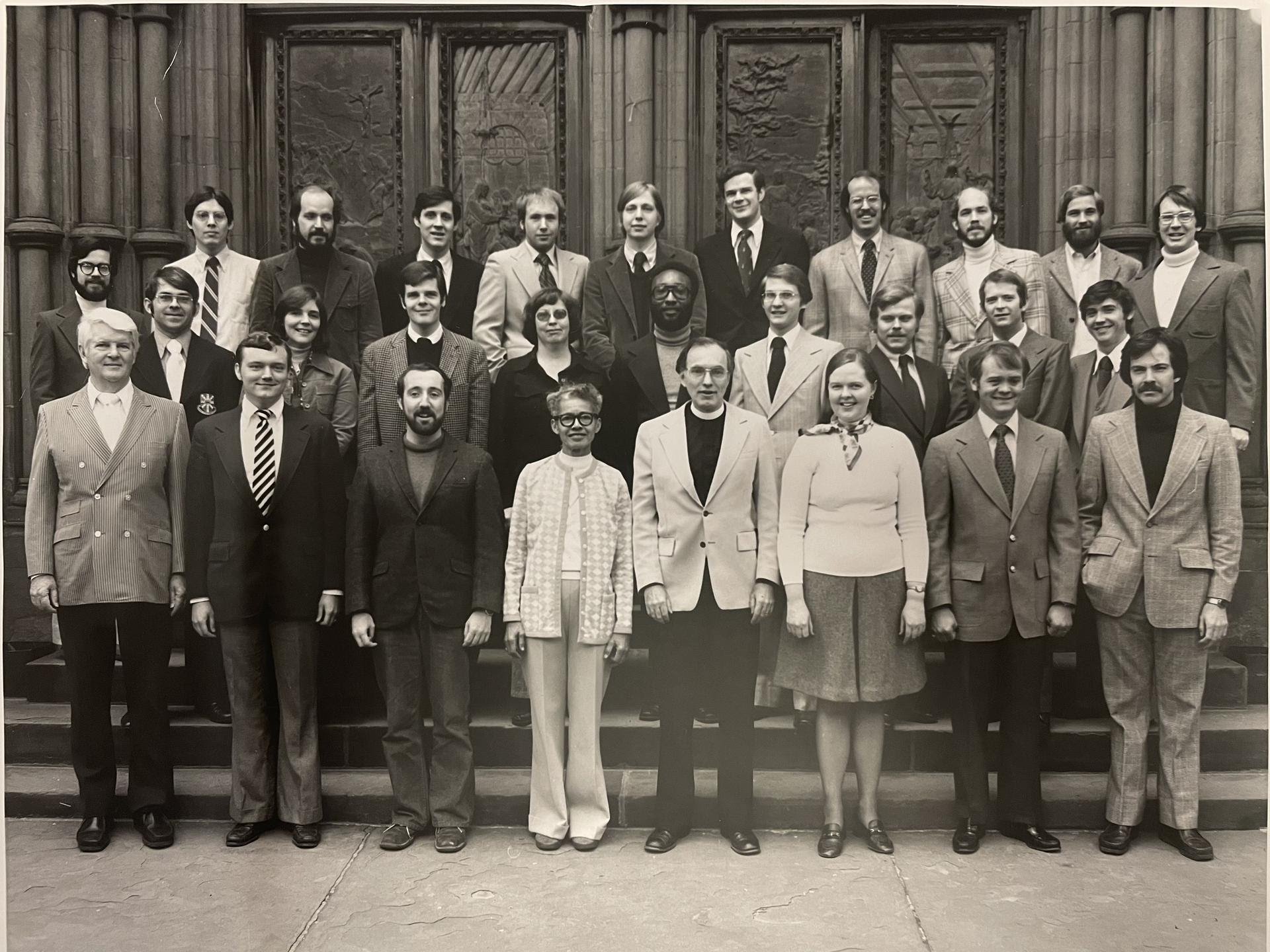The distinguished alumni award 2022
The Rev. Dr. Pauli Murray, Class of 1976
Pauli Murray with the Class of 1976
The 2022 Distinguished Alumni Award was conferred posthumously on the Rev. Dr. Anna Pauline "Pauli" Murray (November 20, 1910 – July 1, 1985) Class of 1976. The award was bestowed in honor and respect for Murray’s life of trailblazing service in civil rights and the Episcopal Church, delayed recognition as an historic figure, and long overdue acknowledgement of the sexism and racism that Murray faced and fought throughout their life, including their time as a student at General Seminary. The Distinguished Alumni Award was conferred during the Alumni Memorial Eucharist May 17, 2022. An new icon of Murray was commissioned and consecrated during the service in the Chapel of the Good Shepherd. In her sermon, the Rev. Dr. Anita Schell ‘83 lifted up Murray’s inspiring biography and asked “How can we by our actions bring hope and continue the witness of our own General alumna Pauli Murray?” recognizing “We have waited too long to acknowledge our profound gratitude to Pauli Murray’s’ witness. Thank you Pauli for boldly bequeathing us a song of hope and love to lead us forward in these days.”
“In this year commemorating the 50th anniversary of women matriculating on the path to ordination,” said the Rev. Susan Wrathall, President of the AEC, “the Alumni Executive Committee decided by acclamation that recognition of Murray’s astonishing life and accomplishments was long overdue.” The award was established in 2004 to lift up both extraordinarily original, path breaking ministries and extraordinarily faithful, though quiet ministries. “This is the first time we’ve given the award posthumously,” Wrathall noted, underscoring the fact that “Murray’s life and work embodies a ministry that endures and inspires.”
The Distinguished Alumni Award was celebrated during the alumni Memorial Eucharist May 18, 2022
Celebrant: The Rev. Susan Wrathall ‘06; Preacher: The Rev. Dr. Anita Schell ‘83; Deacon: The Rev. Deacon Denise LaVetty ‘13
A new icon of Murray was commissioned and consecrated during the service in the Chapel of the Good Shepherd.
watch the service below:
The celebration and recognition of Pauli Murray’s life and work continued throughout the day into the evening. Following the Memorial Eucharist a panel discussion was held to honor and remember who Pauli Murray was and means to us, particularly exploring how we can (and must) continue to lift up Murray’s legacy. The panel was moderated by Associate Dean Julie Faith Parker, welcoming Pauli’s classmates, the Rev. Dr. Ellen Marie Barrett (Sr. Helena) ’75 and the Rev. Jonathan Appleyard ’76 as well as the Rev. Dr. Valerie Bailey Fischer ’20, and the Rev. Diane Shepard, the Chaplain who cared for Pauli during the last year of life. Later in the evening at Baccalaureate dinner the Very Rev. Kelly Brown Douglas, D.D. ’22, along with Dorothy Thomas representing The Pauli Murray Center for History and Social Justice challenged us to carry on Pauli’s prophetic voice.
In receiving her honorary degree, the Very Rev. Kelly Brown Douglas noted "General Theological Seminary has said in no uncertain terms we are ready to get on the arc that bends towards God’s justice, so that when another Alexander Crummell comes through the door, or another Pauli Murray sits in your classroom, you will indeed honor them … so that indeed all who breathe God’s breath will forever be accepted and respected as the children of God."
Remembering and Honoring the Rev. Dr. Pauli Murray (clockwise): The Rev. Dr. Valerie Bailey Fischer ‘20; The Rev. Dr. Anita Schell ‘83; The Rev. Dr. Julie Faith Parker, Associate Dean; The Rev. Jonathan Appleyard ‘76; the Rev. Dr. Ellen Barrett ‘75; The Rev. Diane Shepard
I give thanks for having known Pauli, she was and is a big part of my life and my priesthood to this day. The church is a lot richer for her life and witness and she is a constant reminder that when I speak like Pauli I also must in her words, speak for my race and my people. The Human Race, and just people. - The Rev. Dr. Ellen Barrett ’75
Pauli was intense, not in an edgy way, but was intensely focused on wrestling with faith an understanding. I thought that she was somewhat distant, but I came to see that she was not so distant as she was simply far ahead of me and most students in her studies, ministry, and efforts. While we were asking where and how we might serve God and the church, Pauli was refining and intensifying her prophetic resistance and vision of God’s people. - The Rev. Jonathan Appleyard ’76
We who have lived since her passing have carried the church through so much conflict and confusion — Pauli’s keen legal mind and serious devotion have been a gift to me and all of us along the way, an encouragement to stay strong and clear and keep faith that God’s way and goodness will triumph. - The Rev. Diane Shepard
One of the greatest things about the Episcopal Church today — not that it’s perfect — not that it’s fulfilled everything, it’s got a long way to go, but where would we have been without PAULI MURRAY — what would we have been without PAULI MURRAY — is it possible that we got as far as we did because within our community was a lay person then priest who was reminding us about the enormous love of God, the widenss of God’s mercy — it was her language her thoughts that helped seed the church that we are still striving to be. - The Rev. Dr. Valerie Bailey Fischer ‘20
During the Baccalaureate Dinner, Dorothy Thomas representing the Pauli Murray Center for Peace and Social Justice, inspired the graduates to carry the torch of Pauli’s work by always seeking their place in history: “We cannot know our history if we cannot find our place in it.”
Pauli Murray - Background
Murray was the first African American woman to be ordained a priest (in the first year that women were ordained by the church), the first to receive a degree from Yale Law, and a noted pioneer in the civil rights movement, all while struggling with gender identity a generation before there was proper language for it.
Born in Baltimore, Murray was raised mostly by her maternal grandparents in Durham, North Carolina. At 16 Murray moved to New York City to attend Hunter College, and graduated with a Bachelor of Arts degree in English in 1933. In 1940, Murray sat in the whites-only section of a Virginia bus with a friend. They were arrested for violating state segregation laws. From this incident, and through subsequent involvement with the Workers' Defense League, Murray pursued a career as a civil rights lawyer.
In 1941, Murray enrolled in the law school at Howard University – the only woman in the class – with the intention of ending “Jim Crow” laws. Although graduating first in the class, Murray was denied the chance to do post-graduate work at Harvard University on the basis of gender and went on to earn a master's degree in law at University of California, Berkeley.
In 1961, John F. Kennedy appointed Murray to the Presidential Commission on the Status of Women. Though on the frontlines of civil rights demonstrations and behind the scenes of many organizational meetings since the 1940s, Murray grew disenchanted with the exclusion of women from the movement's leadership. Especially humiliating to Murray was the absence of women speakers at the 1963 March on Washington. In a speech – (later distributed in the pamphlet "The Negro Woman in the Quest for Equality") – to the National Council of Negro Women, Murray articulated the dual burdens of racism and sexism black women faced and called for white and black women to work together to end their shared problems. Calling such prejudice against women "Jane Crow”, Murray became one of the first to criticize the sexism of the civil rights movement. In 1965 Murray became the first African American to receive a Doctor of Juridical Science degree from Yale Law School.
Murray was among the first to argue the unconstitutionality of “separate but equal” laws, an argument cited 10 years later in Brown v. Board of Education by Supreme Court Justice Thurgood Marshall, who called Murray’s book on segregation laws “the bible of the civil rights movement.” While arguing Reed v. Reed, the 1971 Supreme Court case that banned gender discrimination based on the 14th Amendment’s equal protection clause, Ruth Bader Ginsburg listed Murray as a co-author.
A professorship at Brandeis University began in 1967, and while there Murray served on the vestry at Emmanuel Church, Boston. After the loss of her partner Renee Barlow to cancer, Murray sought solace in faith, and by 1973 discerned a call to ordination. In 1973, Murray left the tenured position at Brandeis to attend General Seminary and become a candidate for ordination.
As an activist African American woman, Murray’s path to ordination and time at GTS encountered the same challenges faced in other male-dominated institutions. Murray’s thesis "Black Theology and Feminist Theology: A Comparative View" reflects a theology of liberalism and commitment to political and social change that pushed the boundaries of a seminary and a church not quite ready to grapple with the “interstructuring” of racism, sexism, and economic exploitation.
From the Christoph Keller, Jr. Library Special Collections, a first edition of “Dark Testament” inscribed to the Bishop of New York, Paul Moore.
After ordination in 1977, Murray was invited to celebrate her first Holy Eucharist at Chapel of the Cross in Chapel Hill. The rector, the Rev. Peter Lee, knew it was the same North Carolina chapel where Murray’s grandmother, an enslaved person, had been baptized. Lee went on to become Bishop of Virginia, and an Interim Dean at GTS. In the years that followed, Murray served parishes in Baltimore and in Washington, D.C.
In addition to legal and advocacy work, Murray published two memoirs and a volume of poetry, Dark Testament, which was republished in 2018. The Christoph Keller, Jr. Library holds a copy of the book Murray inscribed at Christmas 1973 to the Rt. Rev. Paul Moore, Bishop of New York, “with the prayer that some day you may be able to ordain me a Priest in our Church. In Christian Fellowship, Pauli Murray”.
On July 1, 1985, Murray died of pancreatic cancer. In 2012 General Convention voted to add the day to Holy Women, Holy Men. In 2018 Murray was made a permanent part of the Episcopal Church’s calendar of saints.






